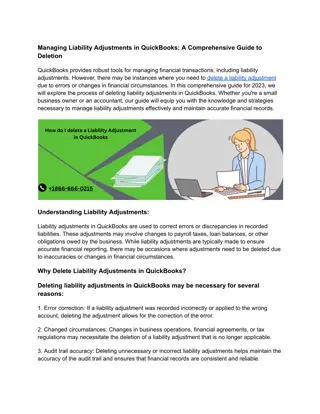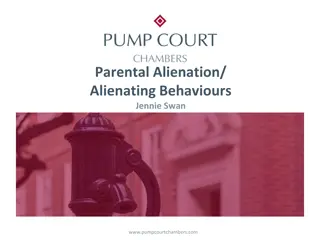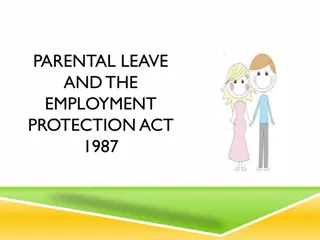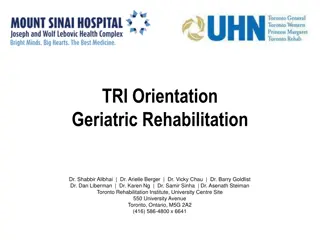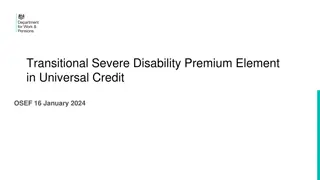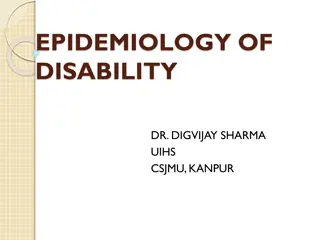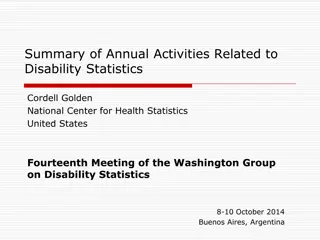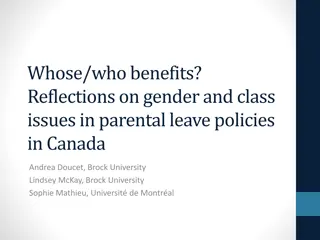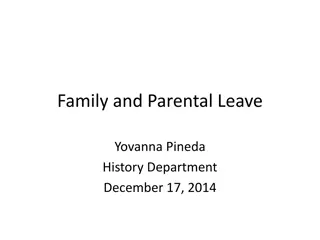Navigating Parental Adjustment Stages in Disability Acceptance Journey
This resource explores the stages parents go through when coming to terms with their child's disability, from shock and denial to acceptance and resilience. It emphasizes the importance of support, understanding, and gradual adjustment for both the parents and the child. Written by Sarah Loquist, CKCIE General Counsel.
Download Presentation

Please find below an Image/Link to download the presentation.
The content on the website is provided AS IS for your information and personal use only. It may not be sold, licensed, or shared on other websites without obtaining consent from the author.If you encounter any issues during the download, it is possible that the publisher has removed the file from their server.
You are allowed to download the files provided on this website for personal or commercial use, subject to the condition that they are used lawfully. All files are the property of their respective owners.
The content on the website is provided AS IS for your information and personal use only. It may not be sold, licensed, or shared on other websites without obtaining consent from the author.
E N D
Presentation Transcript
Conflict Resolution: Spotting the Iceberg Before Becoming the Titanic Sarah Loquist, CKCIE General Counsel
Grieving the Loss Shock, disbelief, anxiety, fear, despair Similar to trauma of a death Disappointment Feel alone and isolated Incomprehensible disparity Grieve dreams for lost child expected
Stages of Adjustment Stage 1: The parent may be shocked, and he or she may cry or become dejected. Sometimes parents may express their feelings through physical outbursts or, occasionally, inappropriate laughter. Stage 2: This is an extension of stage one, and some parents may deny their child s disability or try to avoid that reality in some other way. Some parents will search for or try to propose various actions in an attempt to change the reality. Some may shop for a cure or try to bargain for a different reality. Stage 3: At this stage, parents may feel anger. They may demonstrate their anger outwardly, in the form of rage, or become withdrawn and passive from intense feelings of guilt. Verbally attacking anyone who might be blamed for their unfortunate circumstance, including displacement of responsibility onto the original diagnostician or any supportive professionals, is common. If the parents are feeling angry, guilty, or both, professionals must understand this stage is a very positive point to reach in the process of adjustment and not become defensive if attacked. Stage 4: Parents become resigned to the fact that their child has a disability. In some situations, one or more of the family may slip into depression. Feelings of shame, guilt, hopelessness, & anxiety stemming from a new overwhelming burden of responsibility can become intense. For a few parents, retreating, accompanied by an attempt to hide the child, especially from friends and persons during organized or routine social encounters may be the first sign that they have begun to accept the fact their child has a disability. However, any inclination toward or demonstration of behavior that results in abnormal isolation of one or any family members must be prevented or eliminated.
Stages of Adjustment Stage 5: This is the stage of acceptance, meaning the parents have achieved an unconditional positive regard for the child. Specialists debate whether or not this stage of adjustment includes parents who show only acceptance of their child s condition, commonly call neutrality, or a very important new stage of cognition when parents not only begin to understand and appreciate but strengthen their skills in coping with life s trials as well as being able to help their child, themselves, and others. Reaching this stage is highly correlated with the school inviting parents to become team members in a program with caring professionals, and often paraprofessionals, that is designed to meet all of the child s needs. Stage 6: Parents are able to put their lives back together and enjoy living, imagine a future, and talk of their child free of undue emotion. They can discuss and participate in designing or providing instruction objectively. Healey, B. (1997). Helping Parents Deal with the Fact That Their Child Has a Disability. CEC Today Vol.3 No. 5 - November 1996 The Council for Exceptional Children. Retrieved October 6, 2016 from: http://www.ldonline.org/article/5937/.
Denial of Disability Denial Anger Fear Guilt Confusion Powerlessness Disappointment Rejection Center for Parent Information and Resources (10-6-16). You are not alone: For parents when they learn their child has a disability, Newark, NJ, McGill Smith, P.
Student-Based Decision Making Losing Ground by Conceding Parent Refusal to Agree Keep Team Focused on Needs of the Student
Compromises that Keep FAPE & LRE Intact Use your staffing meetings for strategic planning What compromises can you offer the parents that will not impair FAPE for the student? FAPE means special education & related services that o Are provided at public expense, under public supervision and direction, & without charge; o Meet the standards of the SEA; o Include an appropriate preschool, elementary school, or secondary school education; and o Are provided in conformity with an individualized education program (IEP) that meets the requirements of 300.320 through 300.324. LRE means (i) To the maximum extent appropriate, children with disabilities, including children in public or private institutions or other care facilities, are educated with children who are nondisabled; and (ii) Special classes, separate schooling, or other removal of children with disabilities from the regular educational environment occurs only if the nature or severity of the disability is such that education in regular classes with the use of supplementary aids and services cannot be achieved satisfactorily.
Compromises that Keep FAPE & LRE Intact Evaluations Can be helpful when parents want additional services, typically costs much less to do evaluation than to fight Use of Outside Evaluators May be useful with parents who do not trust school personnel IndependentEducational Evaluation 34 C.F.R. 300.502 o Parents only get 1 each time the agency conducts evaluation with which parents disagrees o Either provide IEE or file due process to defend your evaluation Parent-initiated evaluation: Have to consider
Appeasing the Parent & Potential Impact Pros o Avoids conflict o Everyone happy Cons o Appeasement can t continue forever o Runs risk that student won t receive FAPE o How will staff answer to this on the witness stand in due process or in a formal complaint response? Focus must remain on the student s needs
Requests for Private Placement 34 C.F.R. 300.325 Placement by School o Before private school placement, must have IEP meeting o Must have rep from private school present o After placement, IEP meetings can be called and held by private school at discretion of school district, but school district remains liable for compliance
Requests for Private Placement 34 C.F.R. 300.148 Placement by parents o If disagree re FAPE, parents can seek reimbursement through due process if HO finds that FAPE was not made available & that private school placement is appropriate o Reimbursement can be reduced or denied if (1) parents did not reject school placement at most recent IEP meeting; OR (2) did not give written notice of intent to remove student at lest 10 business days in advance; OR (3) school gave notice of intent to evaluate & parent did not make child available; OR (4) there is a judicial finding of unreasonableness re parent s actions.
Sounding the Alarm! When Impact Can t Be Avoided
Mediation Can be utilized at any time not just after due process has been filed Usually win-win Not cost prohibitive with staff, money, or resources Provided free of charge by the state Often more effective because neutral third party who understands the law is explaining offers to the parents 34 C.F.R. 300.506
Resolution 34 C.F.R. 300.510 Required by statute within 15 days of complaint Delays start of the 45 day due process time period Can be used to reach agreement and avoid hearing, but often not effective due to trust issues Often requires participation of entire IEP team Resolution can be waived by agreement of BOTH parties or can agree to use mediation instead Still need to develop a written settlement agreement District attorney CANNOT attend unless parent attorney attends so you will need to work with attorney in advance or by phone/email during meeting to come up with settlement agreement Remember agreement can be voided within 3 business days by either party per regulation Include dismissal of due process case as part of agreement!
Due Process Can be filed by either party, but most frequently filed by parents Have to send letter with list of hearing officers within 5 business days Sufficiency of complaint if contested, must notify HO and other party within 15 days of receipt LEA Response to Due Process Complaint unless LEA has already sent a prior written notice on the issues raised in the complaint, must submit response to parents & HO within 10 days of receipt of complaint o HO usually not appointed yet. Send copy after appointment.
Due Process By statute, to be completed within 45 days, but can be extended by hearing officer for good cause (except for expedited hearings which must be completed within 20 days) usually extended Can be very costly District has to pay for hearing officer and for transcripts for hearing officer & parents HO has 10 days after close of hearing to issue decision usually won t close hearing until after receive proposed findings of fact & conclusions of law
Due Process After HO decision, either party can appeal to state review officer by filing notice of appeal within 30 days with commissioner of education. KSA 72-3418(b). Appeal is based upon the record. Very rare that additional evidence is allowed. State review officer s decision can be appealed to state district court or federal district court. Special education case law is federal so federal court is best. Student remains in stay-put pending appeal unless parties agree otherwise.
Formal State Complaint Instead of filing for due process, parents can file an administrative formal complaint with the state State Department of Education assigns investigator Submit response with documentation Investigator issues decision If found to be out of compliance, corrective action is ordered Can stipulate to some/all issues and offer self- created corrective actions
Office for Civil Rights Complaint Another administrative remedy available to parents which does not cost them anything Although OCR does not have jurisdiction over IDEA issues, OCR will often use Section 504 to pursue the issue instead While there is no cost to parents, this will involve substantial time and resources on behalf of the district. Call your friendly KASB attorney for assistance if you get one of these!
Sailing Your Lifeboat to Dry Land: Starting Over Again
Rebuilding Your Ship Can t hold parent actions against student Must remain professional with parent Consider reassigning staff members who have difficulty maintaining professional relationship with parents If student is at or near a natural change, such as moving to a new grade level, consider assigning new staff members to positions for which the parents have held the most animosity o If you do this, make your choices wisely. Do NOT assign a brand new staff member to work with difficult parents unless you want to run the staff member off.
References Center for Parent Information and Resources (10-6-16). You are not alone: For parents when they learn their child has a disability, Newark, NJ, McGill Smith, P. Healey, B. (1997). Helping Parents Deal with the Fact That Their Child Has a Disability. CEC Today Vol.3 No. 5 - November 1996 The Council for Exceptional Children. Retrieved October 6, 2016 from: http://www.ldonline.org/article/5937/. Jaksec, C. M., III (2003). The confrontational parent: A practical guide for school leaders. Larchmont, NY: Eye on Education. Perterson Combs, J., Edmonson, S., & Harris, S. (2013) The trust factor: Strategies for School Leaders. Larchmont, NY: Eye on Education. Whitaker, T., & Fiore, D. J. (2001). Dealing with difficult parents: And with parents in difficult situations. Larchmont, NY: Eye on Education.
Questions??? Sarah Loquist sarah.loquistberry@usd305.com THANK YOU FOR COMING!!!




